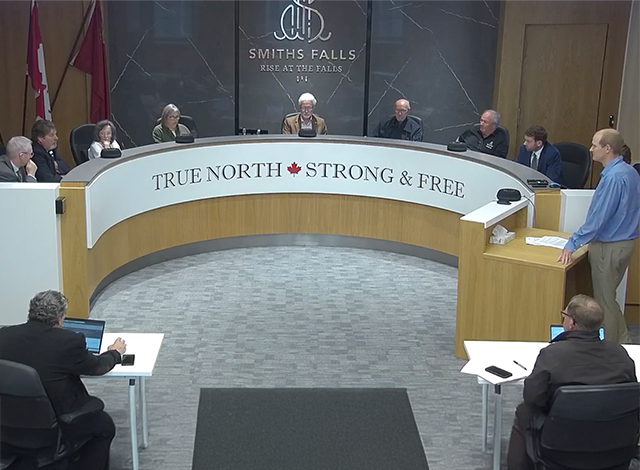LAURIE WEIR
Smiths Falls council is sounding the alarm over Ontario’s latest omnibus development legislation, warning that Bill 17, now officially law, could limit municipal oversight, standardize planning processes in a way that erodes local context, and force towns to absorb the cost of infrastructure associated with growth.
The bill, formally titled the Protecting Ontario by Building Faster and Smarter Act, 2025, received Royal Assent on June 5. It amends several acts including the Planning Act, Development Charges Act and Building Code Act, while granting the Minister of Municipal Affairs and Housing new regulatory authority to streamline development across the province.
Mayor Shawn Pankow said while some of the goals may be well-intentioned, the timing and scope of the changes could leave municipalities financially exposed. One provision, now in effect, eliminates the ability to collect development charges on long-term care homes that haven’t yet received occupancy permits.
“I find this one really irritating and unnecessary,” Pankow said. “Especially when you’ve got projects already well underway. We’re virtually ready for occupancy, probably by September, and all of a sudden we can’t apply development charges. That’s $465,000 gone.”
He questioned whether the province intends that to be a gift to the operator or if the province is clawing back funds it would otherwise provide. “Either way, it’s our taxpayers who are left footing the bill,” he said.
Manager of development services Karl Grenke outlined the key components of the bill during the June 9 committee of the whole meeting, emphasizing that while the legislation has passed, the regulatory framework is still open for public comment until June 12. He said that municipalities can submit feedback to the Ontario Regulatory Registry.
“What’s currently unclear in the legislation may be clarified or complicated further by regulation,” Grenke said, pointing to changes around minor variances as a top concern.
The legislation proposes allowing reductions in zoning setbacks of up to 10 per cent as-of-right, meaning homeowners could skip the usual approval process for small deviations, such as building 5.4 metres from a lot line instead of the required six metres.
“The idea is to create a grace allowance, but it’s a one-size-fits-all approach,” Grenke said. “We already have setback allowances in place for specific neighbourhoods. If the province standardizes it, it could lead to unintended consequences.”
He used the example of a 1.2-metre side yard setback, a minimum designed to comply with Building Code requirements for fire safety and window placement. “Even a 12-centimetre encroachment could compromise design integrity or future development potential next door,” he said.
Grenke recommended that setback reductions remain discretionary, with municipalities empowered to determine whether a minor encroachment truly has zero impact.
Council also reviewed proposed restrictions on what types of supporting studies municipalities can require for new developments. Under the bill, certain documents, including wind studies, lighting plans and design briefs, could be disallowed even if they are needed to evaluate an application.
Grenke noted that in smaller municipalities like Smiths Falls, lighting studies are only requested in specific scenarios, such as large parking lots near residential areas. “The changes seem to be aimed at curbing excess, but they could prevent us from requiring studies we’ve traditionally used to make good planning decisions,” he said.
The bill also proposes limiting peer reviews of engineering reports and requires municipalities to accept certain studies stamped by certified professionals.
Council also reviewed provisions affecting school development, including a proposal to allow new schools and portable classrooms as-of-right in residential zones.
Grenke said he supports that idea in principle, as schools are essential to complete communities, but added that it will be important to maintain site planning control over traffic, servicing and compatibility.
Changes to the Development Charges Act prompted further concern. The bill defers the payment of development charges from the time of permit issuance to occupancy, a change originally introduced for long-term care homes and now expanded to all development types. This shift creates more tracking and administrative burden for municipalities and delays cash flow needed for infrastructure.
Staff will prepare formal comments for submission to the province before the June 12 deadline, based on council’s discussion.
Despite the legislation’s passage, Grenke said there is still a window to shape how the changes will be implemented.



